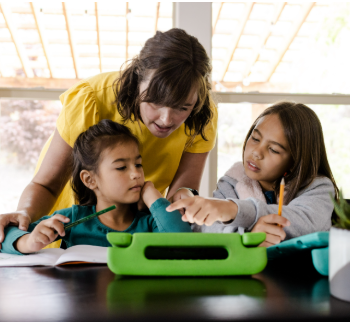Children often learn more from what they see than from what they are told. Parents may talk about the importance of wellness, but it is their daily habits that leave the deepest impression. When parents choose to lead by example, they give their children a living guide to follow. Leading with healthy daily habits is not about perfection. Instead, it is about consistency, kindness to oneself, and small choices that add up over time. Families thrive when wellness is woven into the rhythm of everyday life, and children grow up with the tools to take care of their bodies and minds.
One of the most influential ways parents show leadership in health is through the foods they prepare and enjoy. Family meals create opportunities to introduce balance and variety. Children who watch their parents enjoy fruits, vegetables, and whole grains tend to grow more comfortable with those foods themselves. Parents do not need to insist or pressure; simply modeling enjoyment and variety often inspires children to follow. Even busy days can include moments to prepare something simple yet nourishing. Over time, these mealtime patterns show children that healthy eating is not a task but a natural and enjoyable part of life.
Hydration is another small but meaningful daily habit. Parents who keep water nearby and choose it regularly instead of sugary drinks send a clear message about what keeps the body refreshed. Children often mirror this behavior without much prompting. Something as simple as filling up a reusable water bottle before heading out for the day becomes both a practical step and a teaching moment.
Movement is also a powerful way parents lead by example. When adults make space in their schedules for physical activity, whether that is a morning walk, stretching, or playing outside with their children, they demonstrate that movement is part of a balanced life. Children who see their parents being active are more likely to associate exercise with fun rather than obligation. A parent who dances while cleaning, joins a family bike ride, or practices yoga in the living room shows that there are many forms of movement to explore. The key is consistency rather than intensity. A little movement each day encourages a lifelong relationship with staying active.
Sleep is often overlooked in conversations about health, yet it is one of the most important habits parents can model. Setting a routine for winding down at night, limiting screen time before bed, and creating a calm environment communicates the value of rest. Children who grow up in households where bedtime is treated as a priority often carry those habits into adulthood. Parents who show that they respect their own need for rest teach children that energy, patience, and focus all grow from a foundation of good sleep.
Managing stress is another daily practice that influences children deeply. Parents cannot always shield their families from challenges, but they can demonstrate how to respond with calm and care. Simple techniques such as pausing to take deep breaths, stepping outside for fresh air, or writing down thoughts can show children constructive ways to handle difficult emotions. When parents approach stressful moments with steady attitudes, children learn that challenges are part of life, but they can be faced with resilience.
Time management is also part of leading with healthy daily habits. Parents who balance work, responsibilities, and leisure model how to create structure without rigidity. Children benefit from seeing their parents set priorities, take breaks, and make time for meaningful activities. This balance helps them understand that wellness is not only about the body but also about how time and energy are used. A household where schedules include both responsibilities and rest shows children that a full life has room for both effort and relaxation.
Social connections contribute to family wellness as well. Parents who maintain friendships, participate in community activities, or make time for extended family show children that relationships are part of a healthy life. Shared laughter, conversations, and moments of kindness all leave lasting impressions. When children observe their parents treating others with respect and care, they absorb lessons about empathy and the importance of community.
Technology use is another modern area where parents can lead with healthy habits. By setting limits on screen time, choosing mindful media, and demonstrating the value of offline activities, parents guide children toward balance. When adults model putting phones away during meals or family time, they highlight the importance of presence and connection. Children notice these choices and learn that screens are tools, not replacements for real-world experiences.
Parents also show leadership in the way they speak about health and self-image. Choosing encouraging language instead of criticism helps children build confidence. When parents talk positively about their own bodies and focus on what they can do rather than how they look, children are more likely to develop a healthy self-image. The words used in the home matter greatly, and parents who practice kindness toward themselves set an example of self-respect.
Consistency across these daily habits makes them especially powerful. Children may not remember every piece of advice their parents give, but they remember the patterns they see each day. A parent who starts the morning with a walk, chooses a balanced breakfast, manages stress thoughtfully, and values rest is teaching without speaking. Over months and years, these repeated actions form a model that shapes how children approach their own well-being.
Parents who lead with healthy daily habits also remind their children that wellness is not about being perfect. There will be days when routines are interrupted or choices are less than ideal. What matters most is returning to the habits that support health and showing resilience in the process. Children learn that mistakes or off days do not erase progress. Instead, they are part of the journey and can be met with understanding.
The impact of these habits extends beyond childhood. Young people who grow up with parents modeling wellness often carry those lessons into their adult lives. They may be more likely to prepare their own balanced meals, prioritize sleep, find joy in movement, and manage stress in constructive ways. In this sense, the daily choices parents make ripple forward into future generations.
Leading with healthy daily habits does not require extraordinary effort. It begins with simple, consistent steps that align with values of care, balance, and kindness. Parents who approach their own health with patience create an environment where children feel encouraged to do the same. Each glass of water, each walk, each shared meal, and each calm response to stress adds to the family’s foundation of wellness.
In the end, children do not need parents who are perfect. They need parents who are present, consistent, and willing to model the very habits they hope their children will adopt. Health is not a single action but a collection of daily practices, and when parents lead with those habits, they give their children a gift that lasts a lifetime.






